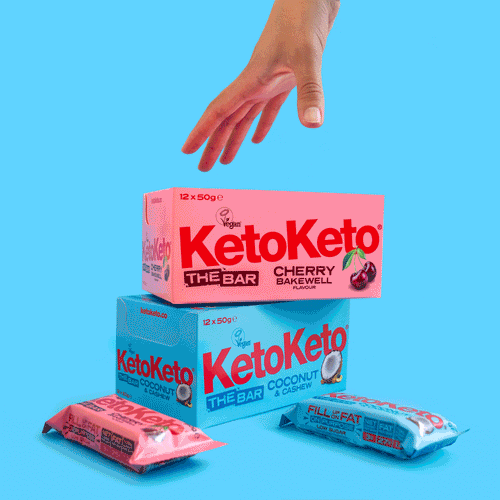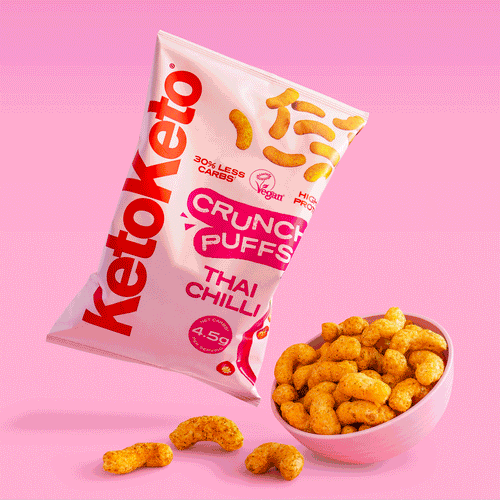Being on a keto diet means paying close attention to the amount of carbs you’re eating. In order to stay in ketosis, most people aim to eat fewer than 50 grams (g) of carbohydrates per day. Many people on a keto diet may think fruit is off limits due to the high sugar content. However, not all fruits are created equal, and several of them can easily fit into a keto diet plan.
How do Carbohydrates Affect a Keto Diet?
To understand why we need to worry about fruit in the first place, we have to understand how a keto diet works. A keto diet is a very low carb diet designed to force the body to use fat for fuel instead of carbs. The diet is highest in fat, moderate in protein, and lowest in carbohydrates to achieve this. When the body lacks carbohydrates for fuel, it releases ketones from stored fat to use as energy, which is known as being in a state of ketosis.
We all naturally go into ketosis during long periods without food, but the keto diet aims to keep a person in ketosis around the clock by avoiding large amounts of carbohydrates. Everyone will be different in the amount of carbs they can consume while staying in ketosis, but most want to stay between 20-50g per day. Any more than this and it is likely you’ll be thrown out of ketosis and back to using carbohydrates as fuel again. [1]
What Fruits Can I Eat on the Keto Diet?
Don’t say goodbye to fruit just yet! While a keto diet has its restrictions, it is important to remember that some carbohydrates are needed on this diet. Some fruits can be a great contribution to your daily carb quota, and provide some significant health benefits to boot.
Avocado
A superfood for the keto diet, avocado’s are full of monounsaturated fats and antioxidants, with only 6 grams of carbs per ½ cup serving. Just half of a heart healthy fat-rich avocado can help boost satiety for up to 5 hours after your meal. [2] As if we needed more convincing, avocados also have both soluble and insoluble fiber to support digestion and healthy gut microbiome, plus high amounts of vitamin C for immune health, and vitamin A for healthy vision. [3]
Coconut
Another high-fat choice, ½ cup of shredded coconut meat contains only 6 grams of carbohydrates. They’re full of medium chain triglycerides (MCT) fats, which have been shown to reduce the risk of Alzheimer’s Disease. [4] Just make sure your coconut has not been sweetened, which is commonly done with prepackaged coconut, in order for it to be keto friendly.
Strawberries
Most berries make a great low carb fruit option, and strawberries are no exception. At just 8 grams of carbs per ½ cup, strawberries may also improve insulin resistance.
Blackberries
Another solid choice in the berry family, ½ cup of blackberries is only around 7 grams of carbs. Blackberries also contain over half the daily recommended intake of Vitamin C and Manganese. [5]
Raspberries
Also coming in at 7 grams of carbs per ½ cup, raspberries are high in antioxidants that protect the health of your cells. They’re also high in vitamin C necessary for collagen production, so they’re great for healthy skin too.
Peaches
While a whole peach can be around 15 grams of carbs, limiting your portion to a ½ cup yields only about 7-8 grams of carbs. Peaches are another vitamin C rich food and the phytonutrients in their yellow flesh are great for supporting healthy eyesight.
Oranges
Oranges contain about 7 grams of carbs per ½ cup serving, and contain dozens of important micronutrients. Folate is one of those, a vital B vitamin responsible for metabolism and healthy fetal development. [6]
Cantaloupe
A ½ cup serving of cantaloupe balls is only going to set you back 7 grams of carbohydrates. Cantaloupe has also been known for many other health benefits, including supporting detoxification, strengthening immunity, and supporting brain function.
Watermelon
A very hydrating choice, watermelon is around 92% water. It also contains only 6 grams of carbohydrates per ½ cup serving. In addition to the water content benefit, the plant compounds lycopene and cucurbitacin E found in it may have anticancer properties.[7]
Lemons
Another citrus favorite, lemons are a versatile fruit to add flavor to any dish. While you probably aren’t eating lemons the same way as other fruits, a little goes a long way in flavoring things like dressings, beverages, and marinades. The juice from a lemon wedge contains less than 1 gram of carbs, making it an excellent keto-friendly choice.

The KetoKeto Box Combo
Our bars are made to help curb cravings and keep you fuller for longer. With only 3g of net carbs per bar, they’re the perfect Keto snack for anytime during the day.
Save more when you buy more, by taking advantage of our Box Combo deal. Pick your favourite flavours or try a new flavour for a change.
Fruits to Avoid on the Keto Diet
These fruits are higher in carbohydrates and may be harder to work into a keto-friendly diet plan. [8] Portion size is key with all fruits, and even these higher carb fruits may work in smaller quantities.
- Apples: One medium apple contains around 25 grams of carbs, which is at least half of your total carbs for the day on the keto diet. Limiting a portion to ¼ cup brings that down to just 6 grams for the serving.
- Grapes: At 27 grams of carbs per cup, the sugar in grapes can add up quickly. Berries provide a lot of the same antioxidant benefits with just a fraction of the carbs.
- Bananas: A medium banana also comes in at around 27 grams of carbs, taking up well over half of your carb budget for the day. Avocado’s actually have more potassium than bananas and can be a great swap in things like smoothies to achieve that same creamy texture. [9]
- Pineapple: Tropical fruits like pineapple are notoriously high in sugar. Just 1 cup of pineapple will contain about 22 grams of carbohydrates.
- Mango: Another tropical fruit to watch for, a whole mango can contain around 50 grams of carbohydrates!
- Dried Fruits: While they’re commonly added to trail mix and other “healthy” foods, dried fruits pack way more calories and sugar than their fresh counterparts. This is due to the loss of water and overall volume during the drying process.
Should I Eat Fruits on a Keto Diet?
Fruits and high fiber foods in general are important to factor into a keto diet, which can often be lacking in the fiber department. Fiber promotes stool regularity, and not getting enough of it can lead to constipation.
Foods that contain fiber also have lower “net carbs.” Net carbs are the total grams of fiber subtracted from the total amount of carbs. For example, 1 whole avocado has about 17 grams of carbohydrates, however it also has 14 grams of fiber. That calculation would be:

The purpose of looking at net carbs is that plant fiber is not absorbed by the body, so many people choose not to count those portions of the overall carb count. To make the most out of your fruit consumption on a keto diet, include the skins of fruits when possible, which is where the majority of the fiber is found.
While fruits are possible to fit on a keto diet, choosing more non-starchy vegetables as a source of fiber might be an option that provides you with bigger portions. Most veggies in this category, including things like leafy greens, broccoli, and green beans, have even less sugar and just as much fiber. Do what works for you, and always check with your doctor or healthcare professional before starting a new diet.
References
1.Masood,W. Et al. NIH. Ketogenic Diet.
2. Sass, C. 9 Health Benefits of Avocados.
3. Eenfeldt, A. Fruits & Berries: A Keto Guide.
4. Womens Health. 26 of the Lowest-Carb Fruits You can Eat on the Keto Diet, According to Dietitians.
5. Verywell Fit. Blackberries Nutrition Facts and Health Benefits
6. Healthline. Oranges 101: Health Benefits
7. Healthline: Top 9 Benefits of Eating Watermelon.
8. LSU Ag Center. What’s in 1/2c of Fruit?
9. Bannan, P. 5 Foods with More Potassium than a Banana






